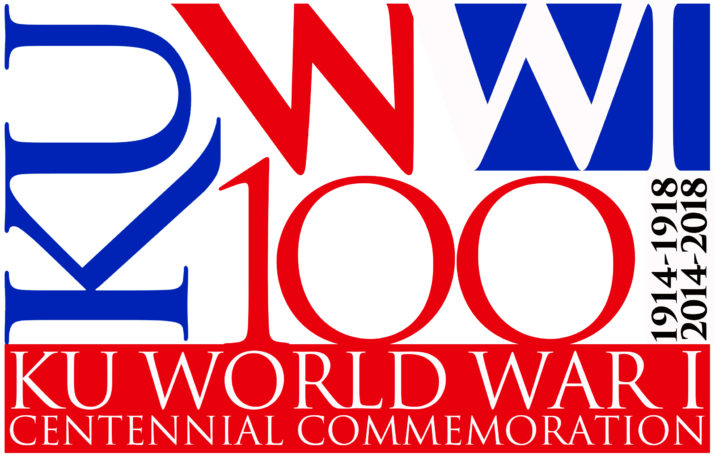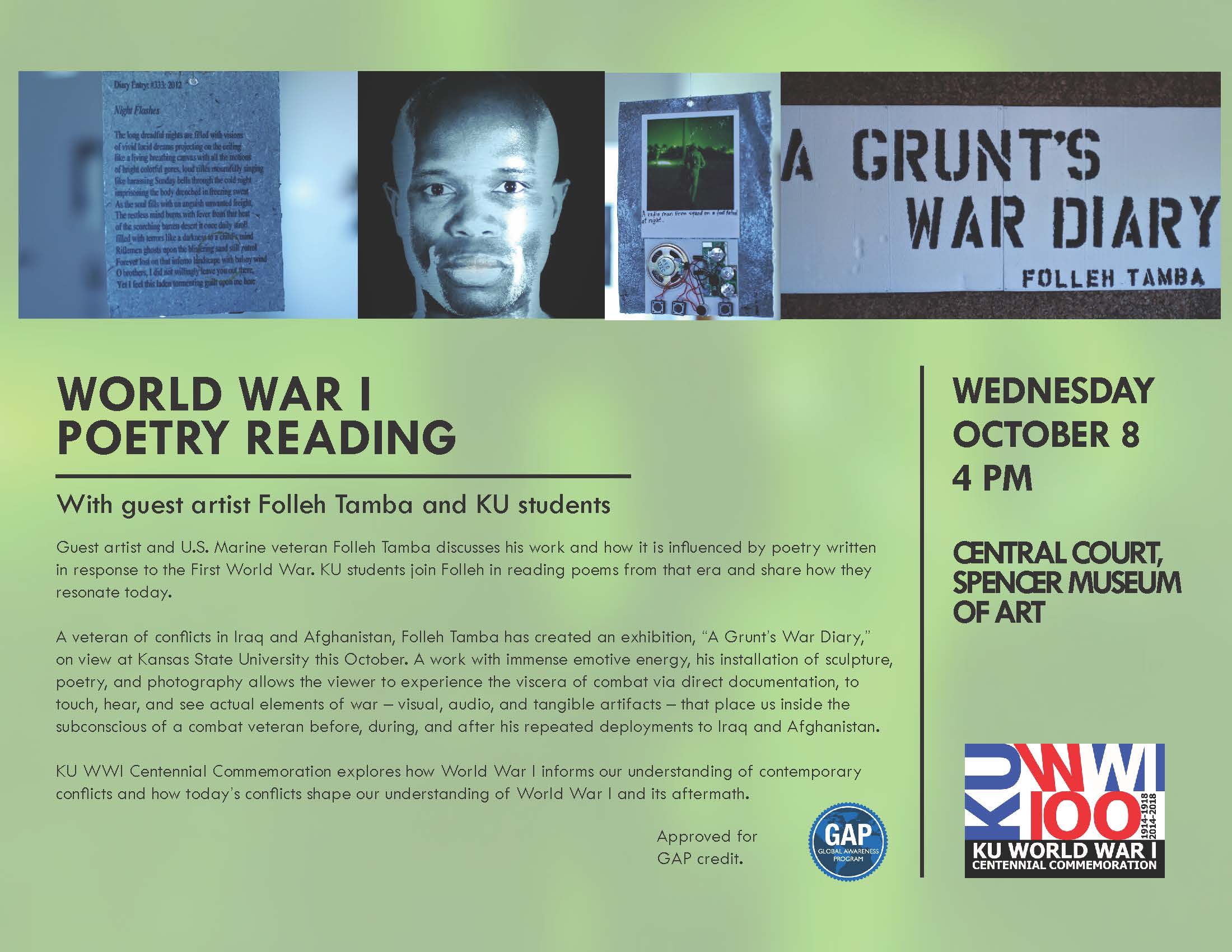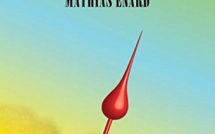

The KU World War I Centennial Commemoration 2014-2018, coordinated by the European Studies Program, explores the historical dimensions of the war and the ways in which the war continues to shape our lives. This initiative aims to develop, coordinate, and promote educational programming and opportunities related to the Great War and to highlight the expertise, resources, and creativity of KU students, faculty, and staff. The project also calls attention to the rich resources available in libraries, archives, and museums on campus and in our region. Since the start of the Commemoration, members of the wider KU community have participated in a Twitter-based e-reenactment of the assassination of Archduke Franz Ferdinand; heard lectures and panel discussions; read, recited and discussed literature; taught and taken courses on the First World War; and attended concerts, screened films, and viewed exhibitions.
The KU WWI Centennial Commemoration reflects the collaborative efforts of nearly 40 campus, local, regional, and national partners. We have developed a successful model for working together on this multiyear project. While European Studies has initiated some of the programs featured in the Commemoration, the project’s momentum and visibility prompt others to request that their events be promoted as part of the Commemoration. We encourage all partners to use our logo, and those who help promote events are listed as co-sponsors. In most cases, funding is shared by multiple partners. We also identify campus programs such as the KU Common Book, for example, to whom we successfully pitched the idea of selecting a literary work about World War I for the KU Common Book. This approach has enabled us to present numerous events that involve different participants and draw different audiences. We have also created a network of people from across campus and in the region who might not otherwise have worked together. The success of this ongoing effort also depends on the valuable contributions of Program Assistant Jessica Irving and Outreach Coordinator Jennifer Duhamel. Lorie A. Vanchena, Academic Director of European Studies and Associate Professor of Germanic Languages & Literatures, chairs the Planning Committee.
Engaging our students in learning about a global crisis still relevant 100 years later is a central component of the Commemoration. They have opportunities to study the history and languages of the conflict as well as the literature, music, and art created during and after the war.
Several faculty members teach courses on World War I. Senior Lecturer Dale Urie, Humanities Program, developed an innovative seminar for first-semester freshmen, How World War I Changed the World. Historians Jennifer Weber and Nathan Wood are currently team-teaching The Great War: The History of World War I for the second time; it has again attracted 60 students. (You can view a video of Professors Weber and Wood discussing the course on the European Studies homepage). Several sections of The Historian’s Craft, the required gateway course for the History major, have focused on World War I. In his sections, Lecturer Jonathan Hagel has students work with photos from University Archives to document how our campus has changed in the last 100 years. Professor Vanchena developed an expanded unit on German Americans during World War I for her course The German Transatlantic Experience: students examine anti-German sentiment in political cartoons and study copies of rare Enemy Alien Registration Affidavits for the state of Kansas held by the National Archives at Kansas City. Professor Marike Janzen, Peace & Conflict Studies, teaches Jaroslav Hašek’s The Good Soldier Schwejk (1921-1923) in Classics of Peace Literature. Students in Professor Van Kelly’s Paris, City of Legends, City of Lights delved into the first Battle of the Marne, the mobilization of Paris, and the victory parades of 1918 and 1944.
KU faculty and students—graduate and undergraduate—are also conducting research on World War I, discovering new knowledge that contributes to and at times reshapes our understanding of the conflict and its long-lasting impact. Drew Burks, PhD candidate, History, is writing a dissertation on the urban environment of Krakow and Lviv, in particular on advertising and consumer culture in these cities during the war. Burks presented his research last August at the Watkins Museum of History. His talk, “Normalcy Wanted: Classified Advertisements for Pianos and Marriage during the Great War in Habsburg Galicia,” was part of a Final Friday event that takes place each month in downtown Lawrence. The Watkins, a major community partner in the Commemoration, has frequently invited KU faculty and students to present their work on World War I. At last August’s event, The Great War at 100: The KU WWI Centennial Commemoration, Wood also spoke about his current research, “From French Motorists to Suspicious Neighbors: Spy-Mania in Cracow in the Early Months of the Great War,” and Vanchena updated the audience on Commemoration plans at KU.
After taking The Historian’s Craft in fall 2016, History major Will Machado pursued his interest in the war period and completed an Honors thesis on the Armenian Genocide. Members of the KU Council for Social Studies (KUCSS), School of Education, presented their research on World War I at the 94th National Council for Social Studies Annual Conference in November 2014. Students designed lessons based on excerpts from KU yearbooks published 1917-1919 and then worked with several teachers in Kansas to field test the lessons. This work formed part of a larger project: Public Commemorations: Visualizing the Heroism, Horror and Humanity of War. Using World War I as an example, the goal was to teach students how to make sense of history depicted in memorials. Vanchena directs a Digital Humanities project on poetry written by immigrants in America in response to World War I; four undergraduate research assistants have worked on this project.
The Office of First-Year Experience has made major contributions to the KU WWI Centennial Commemoration. The KU Common Book 2015-2016 was A Farewell to Arms by Ernest Hemingway. All first-year students received the book during Orientation and were encouraged to read and discuss the book at events throughout the year, including Common Book Discussion Groups led by student leaders, faculty, staff, and administrators; a lecture, “‘Yes,’ I lied. ‘I love you’: The Confessions of Frederic Henry,” by KU English professor and noted Hemingway scholar Jim Carothers; and a film screening of A Farewell to Arms (1932). Students found the novel relevant; as one freshman commented, the U.S. had been involved in armed conflict her entire life. The Spencer Museum of Art selected Self-Portrait (1915) by German artist Otto Dix as the accompanying Common Work of Art. The Office of First-Year Experience also invited Chad Williams, Professor of African and Afro-American Studies at Brandeis University and author of the award-winning study Torchbearers of Democracy: African American Soldiers in the World War I Era (2010) to speak on campus about the experience of 380,000 African American soldiers who fought in WWI.
One highlight of the KU Commemoration has been Everyday Lives on the Eastern Front (2015-2016), a four-part lecture series conceived of by Professors Wood and Scott. We had compelling reasons to organize a lecture series on the Eastern front. Many KU faculty, staff, and students have expertise and interest in the region. The Department of Slavic Languages & Literatures offers instruction in Bosnian-Croatian-Serbian, Polish, Russian, and Ukrainian. The Center for Russian, East European, and Eurasian Studies, a degree-granting program, serves as an important resource for teachers and educators, business, media, government, and military. KU Libraries has been actively acquiring recent publications about the Eastern and Southern fronts to complement its historically strong holdings on the Western front. The long list of co-sponsors for the series reflects the enthusiasm this project generated: KU Common Book; Big XII Faculty Fellowship Program; Center for Russian, East European & Eurasian Studies; Center for Global & International Studies; Germanic Languages & Literatures and History departments; Dole Institute of Politics; European Studies Program; Hall Center for the Humanities; Humanities Program; Jewish Studies; Max Kade Center; Office of Graduate Military Programs; University Honors Program; and the University Press of Kansas.
The series brought four nationally recognized historians to campus. The speakers presented public lectures to large audiences, but they also met with students—primarily freshmen—and connected with people at libraries, museums, and centers on campus and in the region. Heather Perry, University of North Carolina-Charlotte, spoke on “Recycling the Disabled: Army, Medicine and Modernity in the First World War.” She met with students in Wood’s First-Year Seminars at the Dole Institute of Politics, where she showed students archival materials she had used in her research on prosthetics; Audrey Coleman, Senior Archivist at the Dole Institute, then shared materials on disability from Senator Dole’s archives. The lively discussion centered on how perceptions of disability during and after WWI might inform thinking on the pressing issue of veterans’ disabilities today. KU alum Laurie Stoff, Arizona State University, addressed the topic “More than Binding Men’s Wounds: Women’s Wartime Nursing in Russia during the Great War.” She met with students in Urie’s How World War I Changed the World to discuss gender issues in the war and their relevance today. David Stone, U.S. Naval War College, talked about the Russian Army on the Eastern Front, 1914-1917, and Robert Blobaum, West Virginia University, presented the final lecture, “Minor Apocalypse: Everyday Life in Warsaw during the First World War.” Professor Blobaum’s visit was supported by a Big XII Faculty Fellowship Program that enabled him to spend several days on campus and begin collaborating with Wood and Burks on a scholarly project. As this brief overview shows, the value of having these scholars on campus extended far beyond their public lectures.
The Hall Center for the Humanities has brought numerous distinguished speakers to our campus as part of the KU WWI Centennial Commemoration: Sir Max Hastings, “Catastrophe 1914: Europe Goes to War” (November 2013) ; Sean McMeekin, “July 14: Countdown to War” (January 2014); Adam Hochschild, “To End All Wars: A Story of Loyalty and Rebellion, 1914-1918” (March 2015); and Scott Anderson, “Lawrence in Arabia: War, Deceit, Imperial Folly and the Making of the Modern Middle East” (October 2016). These speakers, all of whom drew large audiences, enriched our Commemoration by sharing multiple perspectives on the causes of World War I and its relevance today. KU faculty, students, and staff had many opportunities to join our guests for conversation over lunch, dinner, or coffee. Their visits also generated tie-in events: the Humanities and University Honors Programs continued their WWI Film Series with a screening of the 1962 epic Lawrence of Arabia, for example.
One program from fall 2014 remains a highlight of the KU WWI Centennial Commemoration. A WWI Poetry Reading at the Spencer Museum of Art moved participants and audience members to reflect on how World War I can inform our understanding of more recent conflicts and how recent conflicts can help us understand World War I. Anthea Scouffas, Engagement/Education Director at the Lied Center, had met artist and Marine veteran Folleh Tamba, whose exhibition, “A Grunt’s War Diary,” was on view at Kansas State University. When she learned that Tamba’s work was inspired by World War I poetry, she invited him to participate in a poetry reading at KU. Tamba was born in the United States but grew up in West Africa during the Liberian Civil War. At 18, after spending time in a refugee camp, he returned to the U.S. and enlisted in the Marine Corps. After being deployed 7 times to Iraq and Afghanistan, he earned an MFA in Interdisciplinary Arts and Media. At the Spencer Museum of Art, Tamba discussed his exhibition and read some of his poems. He was joined that afternoon by undergraduate students, many of whom were in ROTC; they each read a WWI poem they had selected and explained why the poem resonated with them. The reading was held in a space next to a new exhibition, The Second Battlefield: Nurses in the First World War, drawn primarily from the Museum’s recent acquisition. This poetry reading attests to the valuable opportunities our partners make possible for KU students.
Our next major event takes place in early April: we will premiere part of the new PBS documentary The Great War. We chose the theme “The Minority Experience in the First World War” so that the Commemoration can contribute to ongoing discussions on campus about diversity, equity, and inclusion. We are partnering with the Haskell Cultural Center and Museum (Haskell Indian National University) and the Watkins Museum of History for this exciting event; both museums will display artifacts from their collections related to the African-American and Native experience in World War I. Once again, we have a long list of co-sponsors who will help promote what promises to be an important, thought-provoking screening and panel discussion. Planning continues for commemorating the 100-year anniversary of the U.S. entry into the war and the final months of the conflict. The Watkins Museum has proposed an exciting initiative: a tour of significant WWI-related sites in Lawrence, including those on the KU and Haskell Indian Nations University campuses.
Space does not permit a complete list of our Commemoration activities, but three important regional partners must be mentioned: the Topeka Combat Air Museum, the Topeka and Shawnee County Public Library, and the National World War I Museum and Memorial in Kansas City. They have invited KU faculty, staff, and students to participate in and attend their events. We benefit from these collaborative relationships and appreciate having such rich resources in the area. For further information about the KU WWI Centennial Commemoration, please visit the European Studies website or email vanchena@ku.edu.
Lorie A. Vanchena, associate professor of Germanic Languages & Literatures at the University of Kanas, is author of the monograph Political Poetry in Periodicals and the Shaping of German National Consciousness in the Nineteenth Century (2000). She has also published an English translation of Reinhold Solger’s novel from 1862: Anton in America: A Novel from German-American Life (2006). She teaches courses on the German transatlantic experience, German literature and the modern era, and German-speaking Europe today. Vanchena serves as Academic Director of the European Studies Program and the Max Kade Center and directs the undergraduate program in the German department. In 2015 she received the J. Michael Young Academic Advisor Award from the College of Liberal Arts and Sciences in recognition of merit for guiding undergraduate students to make good decisions toward their educational and career goals.
This article is part of our special feature Memory and the Politics of the Past: New Research and Innovation.
Photo: World War I Poetry Reading, University of Kansas
Published on April 4, 2017.




